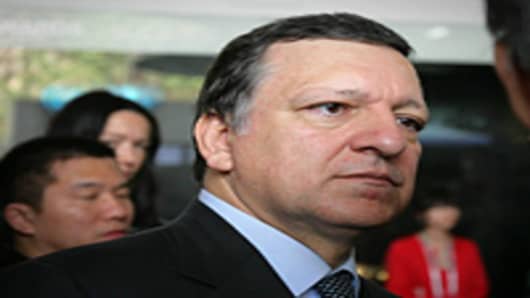All 27 EU countries should submit their big banks to a single cross-border supervisor as part of a banking union to be enacted as soon as next year, the president of the European Commission has urged.
In an interview with the Financial Times, José Manuel Barroso said the EU needed to go beyond the incremental legislative measures proposed by his institution last week and take “a very big step” towards deeper integration if the bloc is to learn the lessons of the sovereign debt crisis.
The plan, which would also include an EU-wide deposit guarantee scheme and a rescue fund paid for by levies on financial institutions, could be achieved by next year and without changes in the bloc’s existing treaties, Mr Barroso said.
“I think now we have conditions to go further that, frankly, we did not have before,” he said. “There is now a much clearer awareness among European member states about the need to go further in terms of integration, especially in the euro area. This is one of the lessons of the crisis.”
However, George Osborne, the UK chancellor, insists Britain will not be part of any banking union that makes its taxpayers liable for recapitalising eurozone banks or puts major British banks under the watch of an EU supervisor.
Mr Barroso’s proposal to put such a supervisor in place would give one EU authority power to wind down a bank and impose losses on bondholders without the approval of national authorities.
He also wants to accelerate action on existing proposals for the deposit guarantee scheme and bank resolution, which are primarily handled at a national level.
Mr Barroso’s suggestion that such integration could be achieved without treaty changes is also likely to raise objections in Berlin, which has insisted such measures can only come with a legal overhaul.
Despite those hurdles, Mr Barroso said he believed there is now greater appreciation in both London and Berlin about the need for an EU-wide banking regime, arguing there was significant political impetus for such changes.
“The European project has always made progress step-by-step,” he said, adopting the language frequently used by Angela Merkel, the German chancellor, to denote her objections to sweeping reforms. “We should continue step-by-step, but now we need a very big step. Either Europe makes a step forward or there is a risk of fragmentation.”
The UK Treasury views such banking union proposals as a “single financial backstop for a single currency”, something which Mr Osborne believes is desirable provided Britain is not expected to take part.
However London is watching carefully to see how the proposed banking union develops. David Cameron, the British prime minister, demanded at a fractious Brussels summit last December that Britain wanted safeguards to ensure the EU’s single market – covering all 27 member states – is not compromised by closer eurozone co-ordination.
Mr Barroso said Britain should be allowed to opt out of such plans – as long as it did not block their progress. While he acknowledged this could further isolate Britain within the EU and was not his preferred choice, Mr Barroso said it was imperative to ensure Britain stayed in the EU.
“It’s of course the British right to decide if they want or not to join further steps of integration,” Mr Barroso said. “If other countries that are not in the euro area want to join us, I think Britain is going to accept this.”
Mr Barroso cautioned that his plans for a banking union, which will begin to be fleshed out as part of a road map to be presented at an EU summit at the end of the month, are part of the EU’s longer term effort to respond to the crisis and should not be seen as a substitute to address current market turmoil.
He said the weekend decision to bailout Spanish banks showed the EU could act decisively in the short term, adding that he urged a reluctant Mariano Rajoy, the Spanish prime minister, to accept the aid during a phone call to Madrid last week.
“It was our position in the commission, as it was when I spoke with him last week, that a programme was necessary and it was both in the interest of Spain and the euro area to have a decision,” Mr Barroso said. “The prime minister of Spain reacted extremely positive to this idea.”
Additional reporting by George Parker in London


